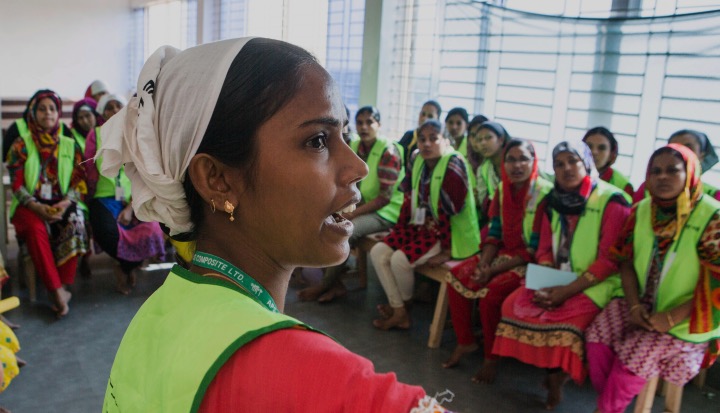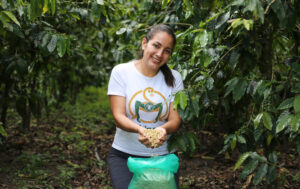Fire, heat, flooding and drought are a recipe for climate disaster for workers. Companies urgently need to not only mitigate their causes but must also invest in resilience – especially in the health and well-being of women workers in corporate supply chains.
Women’s health is material to human rights, productivity, and climate resilience. Women represent a majority of the workforce across many industries, and their health and well-being are hugely affected by practices and policies in global supply chains.
Climate Risks Add Increasing Pressure Across Global Supply Chains – and Women Bear the Burden
Climate change and heat stress seriously impact female workers’ safety, health, and productivity across global supply chains. Women are also disproportionately hurt by climate change, subject to reproductive health harms and heat-induced violence, driven into forced labor and sex work, and losing jobs first when companies automate – to name a few impacts. This is further complicated by the multiple vulnerabilities women face, including low income and education, limited access to reproductive health products and services and to government benefits, and migration status – many women workers are migrants, often spurred by climate change and subject to poor working conditions. As deeply as they are impacted by climate change, women are also leading the charge on climate resilience for their families and communities.
Climate change adds to the pressure on factories across the region to improve productivity while advancing human rights and general labor conditions. Companies and their supply chain partners have a self-interest and an obligation– beyond the lens of charity and narrow legal compliance – to make women’s health part of their climate response.
Investing in Women’s Health and Well-Being is Good Business
Women’s health is like a curb cut. It has multiple benefits, first and foremost on women’s human rights and health, with ripple effects on workplace productivity, management development, morale, and worker resilience. Yet we know that many of the high impact, but less quantifiable benefits are often insufficient to influence corporate decision-making. With the McKinsey Health Institute, WEF released a report this year estimating that closing this “women’s health gap” could be a $1 trillion boost to the global economy by 2040.
The good news is a wealth of resources is available to companies and their suppliers. These come from organizations and initiatives that do not have “environment” in their names but are on the front lines of addressing gendered climate impacts and driving health solutions that will be central to climate resilience in supply chain communities.
To help build the business case for investing in women’s health, UNFPA-APRO has developed in collaboration with Good Business Lab a Return-on-Investment Tool (ROI-T). The ROI-T currently estimates the ROI from investing in seven women’s health-related programs based on actual workplace interventions and performance metrics like productivity, absenteeism and staff turnover.
The tool is about forecasting the financial feasibility of these health interventions at the workplace level by helping companies estimate the financial benefits of investing in sexual and reproductive health (SRH) interventions. For example, studies have shown that offering services and products in the workplace can increase productivity by 15%, clearly demonstrating that investing in the health and well-being of women employees is not only the right thing to do, it is also good business.
Additional work is being developed by UNFPA and its partners to complement the ROI-T with more interventions linked to gender-responsive family initiatives, gender-based violence and harassment, and climate change. For the latter, heat stress programs are showing an incredible potential to deliver significant productivity increases given that evidence has shown that effective ways to protect workers from heat – to which women are among the most vulnerable – are inexpensive and easy to implement.
Opportunities for Corporate Action on Women’s Health and Climate Resilience in Global Supply Chains
Companies would do well to join the UNFPA-led Coalition on Reproductive Justice in Business and consider adopting new indicators for SRHR in the workplace. Or take action through the World Economic Forum’s (WEF) Global Alliance for Women’s Health.
At the UN Foundation’s Universal Access Project, we launched a women’s health initiative this June to support measurable commitments by companies to address the health needs of their employees and workers in supply chains and in the communities in which they operate. The goal is for companies to think differently about their role in advancing women’s health, including the relevance to climate change.
Companies can act now on the very present climate risks to workers, especially women workers, building resilience while also mitigating climate impacts. This moment offers an unparalleled opportunity for companies to be agents of positive change. Yet we know material risk remains the primary lens for corporate decision- making. Statements that ‘it is critical to make women’s health a part of the corporate portfolio of climate and human rights actions may not carry much weight.
But by not applying a wider aperture for their risk lens on climate change, companies will be missing the boat. And they will surely need more than one as the waters rise and production falls, and, as usual, their women workers will be left to fend for themselves and their families.
Shreya Murali, Senior Manager, Transformative Action and David Wofford, Senior Director, Private Section Strategy & Engagement,, Universal Access Project at United Nations Foundation.
With contributions from Davide De Beni, Regional Health Economist and Miguel Proença, Private Sector & Innovative Financing Specialist, United Nations Population Fund Asia and the Pacific Regional Office UNFPA-APRO.
Access more resources on the Climate Justice Learning Zone
This article is part of our Climate Justice Series 2024. Explore our Climate Justice Community Forum Insights paper and discover other insightful articles and podcasts from our global community, published during COP29.









